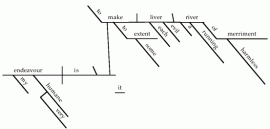Monday
Hi everyone, this is Sarah, the girl who is doing the NaNo WriMo contest. (National Novel Writing Month.) This week we started our Monday morning with life of Fred. Our teacher, after that, gave us a lecture about subtracting, adding and basic multiplication of fractions. After Fred we rolled the dice again in Life Skills Math. My scenario was that my boss had to cut some stuff out of the department and my department was chosen even though we worked hard. I can either take a two week, unpaid vacation and write about what I did on my vacation or I could look for another job. (I haven't decided yet what I will choose). After Life Skills, we had Ethics. In Ethics we learned about loyalty and what you have to do to be loyal. After Ethics we had Logic and in Logic we discussed "And" and "Or" sentences. We also learned about double negative sentences. In Latin we did some dialogue sentences and we did some vocab flash cards.
Tuesday
On Tuesday we started with History and learned about the Sumerian civilization and how they invented the wheel, the modern day clock, cuneiform writing, and reed houses. Our teacher also showed us the basic outline of a Sumerian city. Next we had Geography and we made cuneiform tablets with notes in them for the future us. In Science we went hunting for leaves, and we also identified the different types of the leaves. We also identified the different parts of the leaf. Last but not least we had Life of Fred.
Wednesday
On Wednesday we started off with spelling. This week was different than any other spelling test. Instead of getting pelted with balls we had a hangman version of spelling. If we spelled a word right or got a word derivation right we got to erase one body part from another classmate. If they erased one of your body parts you would have to go without that body part. For example if one of the students erased my eye, I would have to close that eye for the rest of the game. Next we had reading comprehension and we read about the Greek god Apollo and Daphne and how he fell in love with Daphne when Cupid hit him with an arrow of love but he hit Daphne with an arrow of lead making her have a hatred for all men. We also read about the labyrinth and the Minotaur. Next we had writing. Sophie is working on her novel, Able is working on his comic book, and I am writing the blog. Last we had grammar and we learned about Pronouns acting as adjectives and about possessive nouns acting as adjectives. Tomorrow is co-op (Yeah!). At co-op Sophie and Able have Odyssey of the Mind in the morning and I have a writer's guild class. In the afternoon Sophie and I have photography and we are also on a planning committee for co-op events. Able is doing Lego Robotics and a Manga art class. Friday is internship day. I work at a barn learning natural horsemanship, Sophie goes to a daycare, and Able works at a Veterinary hospital. Hope everyone who has read this blog knows how to spell. If you don't, learn quickly or tennis balls will be in your future.
Blog made by Sarah Cyr. (Student)





